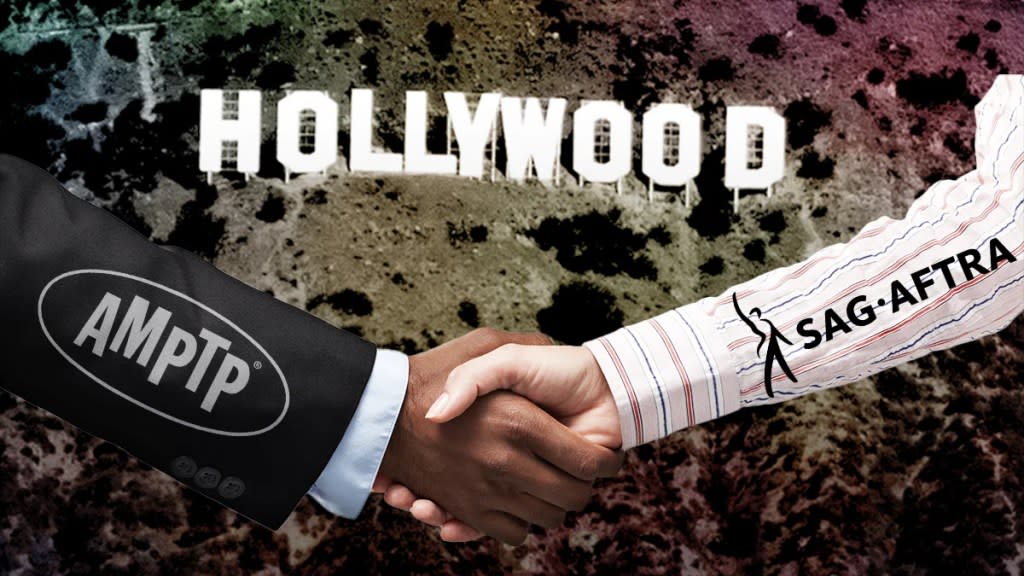SAG-AFTRA Members Ratify New Contract With 78% in Favor

SAG-AFTRA members have ratified the union’s new contract with Hollywood studios by 78.33% of the vote, ending a historic year for Hollywood labor marked by the industry’s first double strike since 1960.
SAG-AFTRA hasn’t revealed the total number of votes in favor of the new agreement between SAG-AFTRA and the Alliance of Motion Picture and Television Producers, but in a statement Tuesday it said turnout was approximately 38.15%.
That number may be extremely low but it actually represents an increase in member participation compared to the guild’s previous contract, as does the margin of victory. In 2020, just 27% of guild members voted, with that year’s contract securing 74% of them. This year’s uptick demonstrates how the strikes staged by SAG-AFTRA and the Writers Guild of America have significantly increased union involvement within the entertainment industry.
“This contract is an enormous victory for working performers, and it marks the dawning of a new era for the industry. Getting to this point was truly a collective effort,” the guild said Tuesday. “With the ratification of this agreement, SAG-AFTRA members will receive unprecedented wage escalation, significantly improved streaming compensation, and the first-ever crucial protections around the use of artificial intelligence technology.”
“A huge thank you is owed to each and every member for your sacrifice and solidarity throughout 2023. Whether you were a strike captain, phone-bank volunteer, picketer, social media warrior, a participant in the wages and working conditions proces, or simply supportive of your union’s efforts, you were part of this moment. Let’s celebrate what we’ve accomplished together and continue to foster the bonds that have been forged throughout this season of solidarity,” the statement continued.
Read the full statement here.
In a separate statement issued after the ratification was announced, AMPTP said, “The AMPTP member companies congratulate SAG-AFTRA on the ratification of its new contract, which represents historic gains and protections for performers. With this vote, the industry and the jobs it supports will be able to return in full force.”
SAG-AFTRA members went on strike for 118 days to demand higher minimum rate increases and a new compensation model for streaming films and TV shows. Artificial intelligence was also a major factor in the strike, as actors demanded regulations that would give them control over how and whether their performances can be used to create digital replicas of themselves.
Among the key gains negotiated in the contract were a new fund jointly run by trustees from the union and studios that would provide compensation to actors who work on streaming titles, with the funds coming from performance bonuses similar to those established by the WGA in their new contract. Shows and movies viewed by at least 20% of a streaming service’s subscribers in the first 90 days of release will be entitled to bonuses, with 25% of the bonus going to the fund while the rest goes to the show or film’s cast.
AI protections negotiated include a requirement that studios specifically define to actors how they intend to use AI on a project. Studios are required to receive an actor’s informed consent to create a digital replica for that project and must receive it again if the actor’s performance is to be used on any future projects.
But the contract did receive substantial opposition within the union membership, with opponents of ratification sharing their objections with #SAGAFTRAVoteNo. Among the arguments made by critics included claims that the AI protections did not go far enough, as studios could simply hire only those who gave their informed consent to make digital replicas of themselves, putting pressure on those who did not wish to work on projects with AI to agree to do so for the sake of their careers.
Opponents also objected to the contract’s language on “synthetic performers,” which are performers generated by AI using real actors’ movements and appearances but are not replicas of a specific actor.
Rather than outright ban such artificial performers as some opponents wish, the contract allows for such performers to be used provided that the union is able to bargain with any studio wishing to use a synthetic performer in a role that could otherwise go to a union actor. Actors may also be eligible for compensation for a synthetic performer’s appearance, but only if a distinctive facial characteristic is used by AI.
Combined, the WGA and SAG-AFTRA strikes shut down entertainment productions for 191 days, significantly delaying film release slates and cutting into the 2023-24 TV season. But the strikes also signaled Hollywood’s prominent role in the resurgence of unions in the United States, with industry workers demanding better wages and working conditions as inflation and rising living costs — particularly in Los Angeles — cut into their income.
Such increased union involvement is likely to play into next year’s labor contract negotations between the studios and below-the-line unions such as IATSE and Teamsters Local 399, as well as the IATSE-affiliated Animation Guild. The WGA and SAG-AFTRA strikes are likely to play a factor in those contracts, as thousands of IATSE and Teamsters members have exhausted their financial reserves during the production shutdowns over the summer and fall.
The post SAG-AFTRA Members Ratify New Contract With 78% in Favor appeared first on TheWrap.


